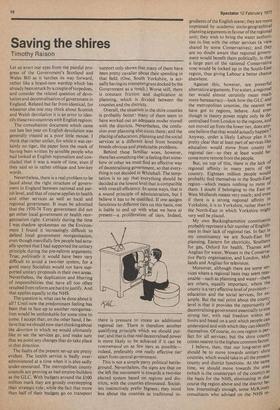Saving the shires
Timothy Raison
Let us avert our eyes from the painful progress of the Government's Scotland and Wales Bill as it lurches its way forward, rather like a brand-new warship which has already been struck by a couple of torpedoes, and consider the related question of devolution and decentralisation of government in England. Related but far from identical, for whatever else one may think about Scottish and Welsh devolution it is an error to identify those two countries with English regions.
The consultation document which came out late last year on English devolution was generally treated as a poor little mouse. I think that rather unfair, for while it was certainly no tiger, the paper bore the mark of having been written by sensible people who had looked at English regionalism and concluded that it was a waste of time, even if they said so in rather oblique and low-key words.
Nevertheless, there is a real problem to be faced about the right structure of government in England between national and parish level, and that of course applies to health and other services as well as local and regional government. It must be admitted that the 1970-74 Tory government did not get either local government or health reorganisation right. Certainly during the time I was shadow spokesman on the Environment I found it increasingly difficult to defend local government reorganisation, even though mercifully few people had actually spotted that I had supported the unitary principle during the pre-reform arguments. True, politically it would have been very difficult to avoid a two-tier system, for a good many Socialists would not have supported unitary proposals in their own areas. Nevertheless, the duplication and blurring of responsibilities that have all too often resulted from reform are hard to justify. And that applies equally to the NHS.
The question is, what can be done about it all ? Until now the predominant feeling has been that to face up to another reorganisation would be unthinkable for some time to come. I accept that; on the other hand, I believe that we should now start thinkingabout the direction in which we would ultimately like to see the services go, and make sure that we point any changes that do take place in that direction.
The faults of the present set-up are pretty evident. The health service is badly overadministered at a time when it is also sadly under-resourced. The metropolitan county councils are proving as bad empire-builders as the G LC. With budgets around the £100 million mark they are grossly overstepping their strategic role; while the fact that more than half of their budgets go on transport support only shows that many of them have been pretty cavalier about their spending in that field. (One, South Yorkshire, is actually having its transport grant docked by the Government as a result.) Worse still, there is constant friction and duplication in planning, which is divided between the counties and the districts.
Overall, the situation in the shire counties is probably better: many of them seem to have worked out an adequate nzodus vivendi with the districts. Nevertheless, the confusion over planning also exists there; and the placing of education, planning and the social services at a different level from housing breeds obvious and predictable problems.
Behind these familiar woes, however, there lies something else: a feeling that somehow or other we must find an effective way of decentralising government, so that everything is not decided in Whitehall. The temptation is to say that everything should be decided at the lowest level that is compatible with overall efficiency. In some ways, that is a sound principle of administration, but I believe it has to be qualified. If one assigns functions to different tiers on this basis, one is liable to end up with what we have at present—a proliferation of tiers. Indeed, there is pressure to create an additional regional tier. There is therefore another qualifying principle which we should pursue; and that is that real decentralised power is more likely to be achieved if it can be concentrated on as few tiers as possible— indeed, preferably one really effective tier' apart from central government.
This is not a simple party political battleground. Nevertheless, the signs are that on the left the movement is towards a two-tier elected system based on regions and districts, with the counties eliminated. Socialists instinctively prefer bigness; they mind less about the counties as traditional in gredients of the English scene; they are more impressed by academic socio-geographical planning arguments in favour of the regional unit; they wish to bring the water authorities in line with the other services (a view shared by some Conservatives); and they are no doubt aware that regional government would benefit them politically, in that a large part of the national Conservative vote would be locked up in the South-East region, thus giving Labour a better chance elsewhere.
Against this, however, are powerful alternative arguments. For a start, a regional tier would almost certainly mean much more bureaucracy—look how the G LC and the metropolitan counties, the nearest we have got to regions, behave. And even though in theory power might only be decentralised from London to the regions, and not moved up from the lower tier, does anYone believe that that would actually happen,? Anyway, under a likely Labour plan it is pretty clear that at least part of services like education would move from county to regional tier—so they at least would become more remote from the people. But, on top of this, there is the lack of regional affinity in many parts of the country. Eighteen million people would probably find themselves in the South-East region—which means nothing to most of them. I doubt if belonging to the East or West Midlands means very much; and even if there is a strong regional affinity In Yorkshire, it is to Yorkshire, rather than to the North-East in which Yorkshire might very well be placed. My own Buckinghamshire constituents probably represent a fair number of Englishmen in their lack of regional ties. In fact in my constituency we are South-East for planning, Eastern for electricity, Southern for gas, Oxford for health, Thames and Anglian for water, Wessex in the Conservative Party organisation, and London, Midlands and Anglian for television.
Moreover, although there are some services where a regional basis may seem reasonable—such as planning and water—there are others, equally important, where the county is a very effective level of provision education and the social services, for example. But the real point about the county level is that it provides the opportunity of decentralising government essentially to one strong tier, with real freedom within set limits and based on a unit which people can understand and with which they can identify themselves. Of course, no one region is perfect for all services; but the shire county comes nearest to the highest common factor. I believe, then, that our long-term aim should be to move towards unitary shire counties, which would take in all the present county and district functions. At the same time, we should move towards the area (which is the counterpart of the county) as the basis for the NHS, eliminating in due course thy region above and the district below. Interestingly enough, some McKinseY consultants who advised on the NHS re organisation (and I suspect then favoured a region-district pattern), have now come down in favour of the same view.
Naturally, there would be serious counterarguments. The medical consultants would be reluctant to lose the regions, who are their Present employers. Moreover, hospital services are organised on a regional scale, so that the less common specialities, say neurosurgery or spinal injury treatment, are provided at a regional rather than area level. li.ut these are not insuperable difficulties, given co-operation plus, of course, the influence of the Department of Health (which anyway largely duplicates the work of the regions). Against these drawbacks there Would be the great advantage of a reduction in bureaucracy; and also, of course, the Possibility of a merger of health and local government under one elected body. This I believe would be a real prize if it e°uld be achieved. It must certainly not be clone over the dead bodies of our consultants, who have already suffered enough; and it might take a long time to persuade tneM that this is the right answer. But time should show that it is. This really could rc)ovide decentralised government with real l-ee and real attraction to capable people to work in it. So far I have talked in terms of the shire c,c)untY pattern; but the same principles snould apply in the metropolitan areas. I 1,ave not frankly decided whether it should oe based on present county or district level. My instinct is to say the latter—so that in effect we go back to the old county borough principle. But in both shire and metropolitan areas I would make a minimum of boundary changes; the reform would essentially be to do with functions. And if we went for the district basis, there might still have to be co-operative consortia on police and perhaps transport.
Does that solve the whole problem? No; there would still be some activities that should be looked at on a broader and also a narrower scale than the new county level. I acknowledge that regional planning has some meaning; but I believe that the right answer is to accept, as we do now, that it is something which is bound to concern central government. We really are not a very big country, and the economics, planning and transport of our various regions are inevitably interdependent. What we really need to do is to make sure that where matters are in fact decided centrally this is openly acknowledged: at present central government too often likes to pretend that some other body is responsible, and therefore it escapes proper scrutiny. It would be an important part of my approach that Parliament should be more actively concerned, in such things as planning policy, which is at present very much the preserve of the Executive.
Meanwhile, nearer the ground, I would accept the principle of the parish or neighbourhood council: indeed, I would enhance it. There should be something which one might well call for the purposes of this argument a 'place'—the place to which people felt they most fully belonged, whether it be a village, a part of a town or a whole town.
Each place would have its elected council, which would serve both ceremonially as the representatives of the place and also as a forum for those who live in it. Its powers of provision might be limited—perhaps to amenities and one or two other things; but it would have the job of expressing the views of its citizens and of summoning its councillors on the main local authorities to hear and respond to them. Moreover, as Mr Rudolf Klein has suggested, it might well taken on the rather unsatisfactory role of the Community Health Councils.
This, then, is in broad terms the overall pattern at which we should aim. The task now is to persuade people generally that it makes sense, and then to move towards it with as little upheaval as possible. Where there are disputes about functions under the present dispensation, the functions concerned should go to the potentially unitary tier. Maybe in some health areas districts might be incorporated in areas—and perhaps even in some shire ,counties the same could happen. But at this stage, I repeat, it is discussion and persuasion that really matter; yet the time when it makes sense to act may come sooner than most of us have so far believed.



































 Previous page
Previous page